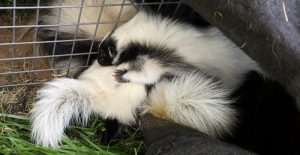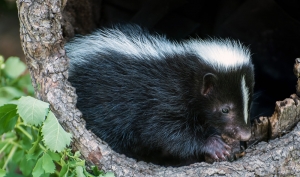What should I do if I find an orphaned or abandoned skunk?
What should I do if I find an orphaned or abandoned skunk?
You were out on one of your nightly “Quarantine Walks” when you came across a small, dark figure in a cardboard box. You’re curious as to what it may be, so you turn on your flashlight- it’s a baby, orphaned skunk. You are unsure of whether you should help, or more likely, run away screaming. What should you do? No need to fear- we’ve got you.
 Skunks are widely feared animals, despite their objectively small stature. However, there is a reason for this fear- their spray. This “skunk spray” can spray objects from multiple feet away, which potentially leave you with a questionable stench for days. They’re also nocturnal creatures, so they roam residential areas exclusively during the nighttime. Despite the ominous spray abilities of skunks, they are overall a pretty harmless animal. If you see a skunk in need, it may be worth it to act (even from a distance). Skunks are most typically found in urban areas where people are plentiful. They are most attracted to residential areas where food is likely to be found. Skunks are willing to eat nearly everything edible; this even includes the leftovers your mother-in-law insisted you take home, but you threw out instead.
Skunks are widely feared animals, despite their objectively small stature. However, there is a reason for this fear- their spray. This “skunk spray” can spray objects from multiple feet away, which potentially leave you with a questionable stench for days. They’re also nocturnal creatures, so they roam residential areas exclusively during the nighttime. Despite the ominous spray abilities of skunks, they are overall a pretty harmless animal. If you see a skunk in need, it may be worth it to act (even from a distance). Skunks are most typically found in urban areas where people are plentiful. They are most attracted to residential areas where food is likely to be found. Skunks are willing to eat nearly everything edible; this even includes the leftovers your mother-in-law insisted you take home, but you threw out instead.
Additionally, they are attracted to places where there can be a possible shelter, meaning bushes, boxes, and covered areas.
If you encounter an abandoned baby skunk, do not be so quick to assume that they truly were abandoned; their mother may simply be on the lookout for food scraps to feed her family. Skunks are also nocturnal, meaning that they can see all of you in the dark. So, don’t make any mindless moves. For example, do not-we repeat, do not- take the skunk to raise them on your own. This will likely result in inadequate care of the animal, simply because most humans do not have the right knowledge to correctly raise a skunk. However, leaving them to be will likely result in a much worse situation, death of the baby animal. The best option would be to wait for a little bit until you have a better understanding of the mother skunk’s whereabouts. Without their mother, the skunk can easily starve, or worse- be susceptible to predation. After fifteen or twenty minutes there is no appearance of a parent skunk, then it is time to make your move.
 If after this period of time there is no mother in sight, the best solution would be to call animal rehabilitation services to come and best take care of the baby skunks. These animal services will give you guidance as to what to do in your specific situation, or more likely, come to take care of the animal. One great example would be Project Wildlife of the San Diego Humane Society, an animal rehabilitation service for injured or abandoned animals (we will provide their contact information below). These services will be able to humanely take in the animals, treat them back to health, and subsequently release them back into the wild. While you wait for the rehabilitation services, you can grab them some shelter if they seem to have none (a cardboard box works wonders). Please do not feed these animals, because feeding them the wrong types of food can be much more harmful than feeding nothing at all. Once services have arrived, congrats! You have now just helped a baby animal in need. This is the best case for the animal because they can be humanely treated back to health, and eventually back into the wild. You can walk back home feeling accomplished, and the skunk can now live another day because of you.
If after this period of time there is no mother in sight, the best solution would be to call animal rehabilitation services to come and best take care of the baby skunks. These animal services will give you guidance as to what to do in your specific situation, or more likely, come to take care of the animal. One great example would be Project Wildlife of the San Diego Humane Society, an animal rehabilitation service for injured or abandoned animals (we will provide their contact information below). These services will be able to humanely take in the animals, treat them back to health, and subsequently release them back into the wild. While you wait for the rehabilitation services, you can grab them some shelter if they seem to have none (a cardboard box works wonders). Please do not feed these animals, because feeding them the wrong types of food can be much more harmful than feeding nothing at all. Once services have arrived, congrats! You have now just helped a baby animal in need. This is the best case for the animal because they can be humanely treated back to health, and eventually back into the wild. You can walk back home feeling accomplished, and the skunk can now live another day because of you.
